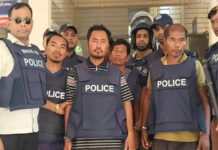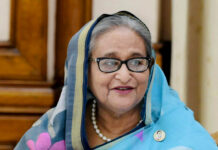
A man uses a cane to control the crowd while providing relief supplies to Rohingya refugees in Cox’s Bazar on Saturday. — Reuters photo
A dishonest quarter is fleecing helpless Rohingyas, who are fleeing violence in Myanmar, in the name of letting them into Bangladesh, then into Cox’s Bazar camps and in some cases deep into the country hiding their identities.
Contrarily, hundreds of other locals, in the absence of adequate relief activities from international aid agencies, are sharing foods and others essentials with the persecuted, tired and exhausted Rohingyas out of a humanitarian impulse.
Many dishonest boat owners and fishermen are ferrying Rohingays in small wooden fishing boats across sea and to the shore of the River Naf, a perilous journey that often takes lives, in exchange for what the ill-fated Rohingyas can afford to give them — money, jewelries, domestic utensil and what not.
Promising accommodation in camps, a quarter is collecting money from the Rohingays who are flooding Bangladesh since August 25 when the latest spell of violence erupted in Rakhine State, say police and locals.
Still others are charging more than double the fare while carrying Rohingyas to Teknaf, Ukhia in auto-rickshaws and realising money from them for helping them board buses heading towards outlying districts, they say.
Bangladesh Police in a statement on Saturday asked Bangladeshi people not to rent houses to any Rohingyas as they would be living in designated camps and their mobility should be confined only within Cox’s Bazar until their repatriation to Myanmar.
Teknaf Upazila Nirbahi Officer Zahid Hossain Siddique said that they so far jailed or fined 150 middlemen, mostly boat owners and fishermen helping Rohingyas enter the country.
Rapid Action Battalion 7 company commander Ruhul Amin said that the elite force so far arrested six people at Ukhia as they were taking money from the Rohinagys promising them accommodation in camps.
Chittagong Metropolitan police deputy inspector general SM Monir-uz-zaman said that they set up 27 check-posts in Bandarban, Khagrachhari, Rangamati and Chittagong districts to contain the spread of Rohingyas.
The police move came after reports that Rohingays were spreading out to some places like Patenga, Chandgaon, Bakolia, Hathazari and Sitakunda in Chittagong and other districts such as Feni, Manikganj and Sunamganj.
‘The police and the administration are doing their best to ensure that the Rohingyas do not spread to others places,’ Monir said in Chittagong on Saturday.
The Bangladesh authorities, with the help of the World Health Organisation and the UNICEF, on Saturday launched weeklong vaccination campaigns among Rohingya children against measles, rubella and polio, aiming to check possible outbreak of diseases, said Cox’s Bazar district civil surgeon Abdus Salam.
UNHCR Bangladesh spokesperson Joseph Tripura said that 4.09 lakh Rohingyas entered Bangladesh in the past three weeks. Bangladesh foreign ministry officials estimated that the number of new and old Rohingya entrants crossed eight lakh.
The UNHCR and the IOM fear that about 10 lakh persecuted ethnic minority people may enter Bangladesh in this new spell.
The ongoing ethnic cleansing began in Rakhine on August 25, when Arakan Rohingya Salvation Army reportedly attacked dozens of police posts and checkpoints and one military base in Rakhine.
Hundreds of Rohingyas continued to enter Bangladesh crossing the River Naf on Saturday.
Locals said that they were pouring into Bangladesh through at least 17 points at Shah Parir Dwip dodging border guards.
Border guard and local administration sources said that Bangladeshi fishermen and boat owners had contacts with Myanmar people through cell phone.
They said different rates ranging from Tk 2,000 to Tk 10,000 were being charged from the Rohingyas for bringing them to Bangladesh.
Bangladesh shares with Myanmar a 272-km border that falls in Bandarban and Cox’s Bazar. Of this, a 52-km stretch is covered by the Naf.
Enayetullah, 50, of village Noapara in Rakhine, crossed the Naf in a trawler on September 15 with his wife Nuhatu, 36, and landed at village Majhipara of Shah Purir Dwip.
He said that he had to pay 70,000 Myanmar Kyat (about Tk 4,000) for each for coming to Bangladesh.
Karimulla, 25, who came to Bangladesh by trawler with his wife Khadija, 20, and their daughter Chorina, 7, said he had to pay Tk 4,000 for coming to Bangladesh. He managed the Bangladeshi currency from Myanmar and paid in taka.
Rahim Mia, a resident of Maijhpara of Shah Purir Dwip, said that most of the boats or trawlers involved in ferrying the Rohingyas were of fishermen of the island.
‘Rohingyas are selling their ornaments, lands to pay the boat fare and they are doing this to save their lives,’ he said.
Locals alleged that on many occasions, in case of failing to pay the promised money, the perpetrators keep the Rohingyas confined.
Border Guard Bangladesh commanding officer in Tekhnaf Lieutenant Colonel SM Ariful Islam said that they had already identified the people behind the crime and would launch crackdowns on them.
He said, ‘A large number of people have been kept confined for ransom. On information, we conducted series of operation in the area every night.’
Zahid Hossain Siddique said that so far they convicted over 150 people who were working as middlemen to bring Rohingyas into Bangladesh and many of these people were sentenced to six months in jail.
Coming into Bangladesh, the Rohingyas need to pay increased transport fair. Trawler fare from Shah Purir Dwip to Teknaf jumped to Tk 40 from Tk 20 before August 25, said locals, adding that auto-rickshaw fair from Teknaf to Balukhali increased to Tk 700 to Tk 800 from the previous Tk 300 to Tk 400.
Some of the locals of Tengrakhali, Hakimpur, Burmapara and others areas of Ukhia are identifying themselves as camp mangers and taking Tk 500 to Tk 2,000 from the Rohingyas promising them shelters.
RAB 7 company commander Ruhil Amin said that they arrested six in the upazila as they were cheating the Rohingyas with false camps.
Local’s alleged that some of the Bangladeshi people were also helping Rohingyas to board buses for others districts by taking Tk 100 to Tk 500 in exchange. They are collecting tickets with their names and distributing among the Rohingays.
Locals also complained that exodus of so many Rohingays in such a short time raised prices of household items, rent, public transportation fares and labour in Teknaf and Ukhia towns of the Cox’s Bazar, one of the hot tourist spot of the country.
One more body of a Rohingya woman was recovered from the River Naf at Sabarang point on Saturday, said Teknaf police station officer-in-charge Md Main Uddin Khan.
With this, a total of 112 bodies, mostly of women and children, have been recovered from the river since August 25.
Chaotic scene still prevails along the roadsides of Cox’s Bazar where local volunteers are distributing food and other supplies haphazardly among the Rohingyas when the local administration calls for distributing the aids through it.
Two children and a woman were injured in a stampede during relief distribution among Rohingyas on Friday.
Bangladesh Army has started to carry out international aid services for the Rohingyas in Cox’s Bazar, said Inter Services Public Relation Directorate director Lieutenant Colonel Mohammad Rashidul Hasan.
A delegation of the Awami League-led 14-party alliance visited Rohingya refugee camps at Ukhia and Teknaf and distributed relief materials among the refugees on the day.
Construction of 14,000 additional shelters for Rohingyas has begun in Cox’s Bazar with officials saying the makeshift shelters could house 5,60,000 refugees who fled their home in Myanmar to evade atrocities.
They said shelters would be erected on a temporary basis while each of them could accommodate six families or 40 people.
‘The prime objective of the initiative is to prevent the refugees from fanning out elsewhere and handle the crisis properly,’ disaster management and relief ministry secretary Shah Kamal.
S









